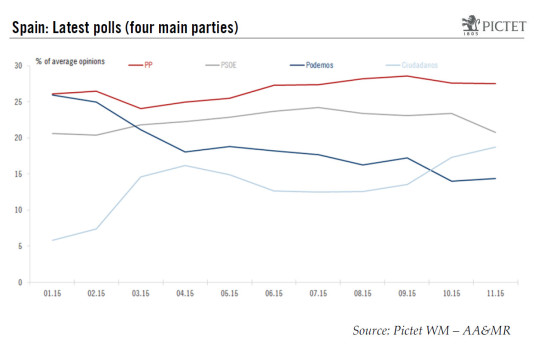Yesterday, November 9th, the Catalan parliament voted to formally begin the process of breaking away from Spain. A resolution in the Catalan parliament laying out an 18-month road map for the region's independence was passed by 72 to 63, backed by MPs from the pro-independence “Junts pel Si” coalition and the smaller far-left Popular Unity Candidacy (CUP). The resolution calls for further laws to facilitate the creation of an independent social security system, a Catalan tax authority and other fledgling state institutions in no more than 30 days. It also specifies that the regional parliament will no longer be bound to abide by decisions taken by institutions of the Spanish state, including the Constitutional Court. Tensions surrounding pro-independence battle in Catalonia Yesterday’s resolution came less than six weeks after the Catalan regional election. It is consistent with a commitment made by pro-independence parties. On 27 September 2015, pro-independence parties won a majority of seats (72 out of a total of 135 seats), but not of votes (47.8%). The election was presented as a de-facto pro-independence referendum. Although the result was enough for a majority in the regional parliament, many more votes would have been required in a proper referendum.
Topics:
Nadia Gharbi considers the following as important: Macroview, Uncategorized
This could be interesting, too:
Claudio Grass writes The Case Against Fordism
Claudio Grass writes “Does The West Have Any Hope? What Can We All Do?”
Claudio Grass writes Predictions vs. Convictions
Claudio Grass writes Swissgrams: the natural progression of the Krugerrand in the digital age
Yesterday, November 9th, the Catalan parliament voted to formally begin the process of breaking away from Spain.
A resolution in the Catalan parliament laying out an 18-month road map for the region's independence was passed by 72 to 63, backed by MPs from the pro-independence “Junts pel Si” coalition and the smaller far-left Popular Unity Candidacy (CUP). The resolution calls for further laws to facilitate the creation of an independent social security system, a Catalan tax authority and other fledgling state institutions in no more than 30 days. It also specifies that the regional parliament will no longer be bound to abide by decisions taken by institutions of the Spanish state, including the Constitutional Court.
Tensions surrounding pro-independence battle in Catalonia
Yesterday’s resolution came less than six weeks after the Catalan regional election. It is consistent with a commitment made by pro-independence parties. On 27 September 2015, pro-independence parties won a majority of seats (72 out of a total of 135 seats), but not of votes (47.8%). The election was presented as a de-facto pro-independence referendum. Although the result was enough for a majority in the regional parliament, many more votes would have been required in a proper referendum. Despite this and despite the fact that opinions polls show that less than 50% of Catalans support independence, the pro-independence parties decided to vote on the pro-independence resolution.
Reaction from Madrid was swift. Spain’s Prime Minister, Mariano Rajoy, said his government was already working to annul the resolution and called an emergency meeting. At national level, the central government has the support from other big national parties (Ciudadanos and PSOE) to block the path to Catalan independence.
What’s next
The Constitutional Court is expected to accept the government’s appeal. The best course of action would be a moderate approach, such as declaring the Catalan vote null, rather than an aggressive response. The latter might increase the support for the pro-independence parties. It also remains to be seen how the suspension would affect the Catalan parliament. If the Catalan parliament decided to act on the resolution and defy Spain’s Constitutional Court, the response from Madrid could be tough. Meanwhile, the Court may impose sanctions against individual leaders, as was the case against Artur Mas when he organised a non-binding referendum on independence for the region on 9 November 2014. In that case, the Popular Party increased the power of the Court to impose such a suspension in October.
In the meantime, the presidential election is due to be held today (10 November) in the Catalan parliament. The pro-independence parties embrace a very heterogeneous political ideology and remain divided on several topics, including supporting the re-election of Artur Mas as the Catalan President. CUP is firmly opposed to the re-election of Mr Mas. If he does not receive sufficient support, the coalition can either put forward an alternative candidate or try to prolong the internal negotiations until 9 January. If no agreement is reached, new elections will have to be called.
Overall, changing the constitution to allow Catalonia to be independent appears an extremely demanding scenario. A negative outcome cannot be excluded, but from an economic point of view a unilateral declaration of independence would be a lose-lose outcome for both Spain and Catalonia. In our view, a compromise between the Catalan parliament and the new central government (general elections are scheduled for 20 December) is the most likely outcome. Some concession might be accepted, in particular in respect of regional financing. Negotiations are likely to be tense between Madrid and Barcelona. The Catalan crisis will probably be exploited by politicians to gain votes for the general elections (to be held on 20 December). The latest polls showed that the general elections will result in a fragmented national parliament. Mr Rajoy and his popular party hold a small lead but it would be insufficient to keep their parliamentary majority.
Spanish political uncertainties would have the potential to create significant pressure on Spanish assets, but are unlikely to create any systemic crisis. Spain's economy has posted impressive real GDP growth rates and is likely to continue to do so in 2016 as well.

